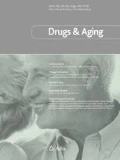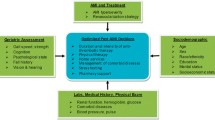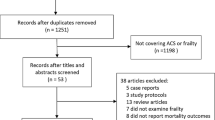Abstract
Background
The number of elderly and the prevalence of dementia have grown considerably in recent years. Little is known about how aging and dementia affect care patterns after discharge for acute coronary syndrome (ACS).
Objective
This study was designed to assess the impact of dementia on care patterns after admission for patients with ACS across different age groups.
Methods
Of 87,321 patients hospitalized for ACS between 1 January 2006 and 31 December 2007, 1,835 patients with dementia and 3,670 matched patients without dementia (1:2 ratio, matched by age, sex and hospital level) were identified from Taiwan’s National Health Insurance Research Database. Use of interventional therapies at hospitalization and guideline-recommended medications post-discharge were compared between patients with and without dementia across different age groups (≤65, 66–75, 76–85, ≥86 years). Multivariate logistic regression models were performed to examine the impact of dementia on care patterns.
Results
Overall, dementia was associated with a 27 % lower likelihood of receipt of interventional therapies [adjusted odds ratio (OR) = 0.73; 95 % CI 0.63, 0.83] and a 22 % lower likelihood of guideline-recommended medications (adjusted OR = 0.78; 95 % CI 0.68, 0.89) in ACS patients. The use of interventional therapies and guideline-recommended medications decreased with age, and interactions between age and dementia were found. The proportions of patients receiving interventional therapies were 39.4 % (without dementia) versus 21.8 % (with dementia) in the youngest age group and 18.6 % (without dementia) versus 14.5 % (with dementia) in the oldest age group. Patients with dementia (age ≤65 years 73.6 %; age 66–75 years 82.3 %; age 76–85 years 71.8 %; age ≥86 years 55.6 %) were less likely to receive guideline-recommended medications as compared with those without dementia (age ≤65 years 85.6 %; age 66–75 years 87.5 %; age 76–85 years 81.2 %; age ≥86 years 62.0 %).
Conclusion
Dementia and aging were associated with decreased use of interventional therapies and guideline-recommended medications in ACS patients.

Similar content being viewed by others
References
Yusuf S, Zhao F, Mehta SR, Chrolavicius S, Tognoni G, Fox KK. Effects of clopidogrel in addition to aspirin in patients with acute coronary syndromes without ST-segment elevation. N Engl J Med. 2001;345(7):494–502.
Freemantle N, Cleland J, Young P, Mason J, Harrison J. Beta blockade after myocardial infarction: systematic review and meta regression analysis. BMJ. 1999;318(7200):1730–7.
ACE Inhibitor Myocardial Infarction Collaborative Group. Indications for ACE inhibitors in the early treatment of acute myocardial infarction: systematic overview of individual data from 100,000 patients in randomized trials. Circulation. 1998;97(22):2202–12.
Dagenais GR, Pogue J, Fox K, Simoons ML, Yusuf S. Angiotensin-converting-enzyme inhibitors in stable vascular disease without left ventricular systolic dysfunction or heart failure: a combined analysis of three trials. Lancet. 2006;368(9535):581–8.
Baigent C, Keech A, Kearney PM, Blackwell L, Buck G, Pollicino C, et al. Efficacy and safety of cholesterol-lowering treatment: prospective meta-analysis of data from 90,056 participants in 14 randomised trials of statins. Lancet. 2005;366(9493):1267–78.
Soiza RL, Leslie SJ, Harrild K, Peden NR, Hargreaves AD. Age-dependent differences in presentation, risk factor profile, and outcome of suspected acute coronary syndrome. J Am Geriatr Soc. 2005;53(11):1961–5.
Avezum A, Makdisse M, Spencer F, Gore JM, Fox KA, Montalescot G, et al. Impact of age on management and outcome of acute coronary syndrome: observations from the Global Registry of Acute Coronary Events (GRACE). Am Heart J. 2005;149(1):67–73.
Boyd CM, Darer J, Boult C, Fried LP, Boult L, Wu AW. Clinical practice guidelines and quality of care for older patients with multiple comorbid diseases: implications for pay for performance. JAMA. 2005;294(6):716–24.
Margulis AV, Choudhry NK, Dormuth CR, Schneeweiss S. Variation in initiating secondary prevention after myocardial infarction by hospitals and physicians, 1997 through 2004. Pharmacoepidemiol Drug Saf. 2011;20(10):1088–97.
Yusuf S, Islam S, Chow CK, Rangarajan S, Dagenais G, Diaz R, et al. Use of secondary prevention drugs for cardiovascular disease in the community in high-income, middle-income, and low-income countries (the PURE study): a prospective epidemiological survey. Lancet. 2011;378(9798):1231–43.
Schoenenberger AW, Radovanovic D, Stauffer JC, Windecker S, Urban P, Eberli FR, et al. Age-related differences in the use of guideline-recommended medical and interventional therapies for acute coronary syndromes: a cohort study. J Am Geriatr Soc. 2008;56(3):510–6.
Yan RT, Yan AT, Tan M, Chow CM, Fitchett DH, Ervin FL, et al. Age-related differences in the management and outcome of patients with acute coronary syndromes. Am Heart J. 2006;151(2):352–9.
Rosengren A, Wallentin L, Simoons M, Gitt AK, Behar S, Battler A, et al. Age, clinical presentation, and outcome of acute coronary syndromes in the Euroheart acute coronary syndrome survey. Eur Heart J. 2006;27(7):789–95.
Barchielli A, Buiatti E, Balzi D, Santoro GM, Carrabba N, Fabiani P, et al. Age-related changes in treatment strategies for acute myocardial infarction: a population-based study. J Am Geriatr Soc. 2004;52(8):1355–60.
Rathore SS, Mehta RH, Wang Y, Radford MJ, Krumholz HM. Effects of age on the quality of care provided to older patients with acute myocardial infarction. Am J Med. 2003;114(4):307–15.
Mehta RH, Rathore SS, Radford MJ, Wang Y, Krumholz HM. Acute myocardial infarction in the elderly: differences by age. J Am Coll Cardiol. 2001;38(3):736–41.
Brogan GX Jr, Peterson ED, Mulgund J, Bhatt DL, Ohman EM, Gibler WB, et al. Treatment disparities in the care of patients with and without diabetes presenting with non-ST-segment elevation acute coronary syndromes. Diabetes Care. 2006;29(1):9–14.
Bugiardini R, Yan AT, Yan RT, Fitchett D, Langer A, Manfrini O, et al. Factors influencing underutilization of evidence-based therapies in women. Eur Heart J. 2011;32(11):1337–44.
Hasdai D, Haim M, Behar S, Boyko V, Battler A. Acute coronary syndromes in patients with prior cerebrovascular events: lessons from the Euro-Heart Survey of Acute Coronary Syndromes. Am Heart J. 2003;146(5):832–8.
Berger AK, Duval S, Krumholz HM. Aspirin, beta-blocker, and angiotensin-converting enzyme inhibitor therapy in patients with end-stage renal disease and an acute myocardial infarction. J Am Coll Cardiol. 2003;42(2):201–8.
World Alzheimer Report: the global economic impact of dementia. London: Alzheimer’s Disease International (ADI). 2010.
Ferri CP, Prince M, Brayne C, Brodaty H, Fratiglioni L, Ganguli M, et al. Global prevalence of dementia: a Delphi consensus study. Lancet. 2005;366(9503):2112–7.
Kimata T, Hirakawa Y, Uemura K, Kuzuya M. Absence of outcome difference in elderly patients with and without dementia after acute myocardial infarction. Int Heart J. 2008;49(5):533–43.
Hirakawa Y, Masuda Y, Kuzuya M, Iguchi A, Uemura K. Differences in cardiac management and in-hospital mortality between elderly patients with and without dementia after acute myocardial infarction: findings from TAMIS data. Nippon Ronen Igakkai Zasshi. 2007;44(5):606–10.
Cordero A, Morillas P, Bertomeu-González V, Quiles J, Soria F, Guindo J, et al. Pathological ankle-brachial index is equivalent of advanced age in acute coronary syndromes. Eur J Clin Invest. 2011;41(12):1268–74.
Sloan FA, Trogdon JG, Curtis LH, Schulman KA. The effect of dementia on outcomes and process of care for Medicare beneficiaries admitted with acute myocardial infarction. J Am Geriatr Soc. 2004;52(2):173–81.
International classification of diseases, ninth revision (ICD-9). Geneva: World Health Organization; 2011.
Wu CS, Ting TT, Wang SC, Chang IS, Lin KM. Effect of benzodiazepine discontinuation on dementia risk. Am J Geriatr Psychiatry. 2011;19(2):151–9.
Brown AF, Mangione CM, Saliba D, Sarkisian CA. Guidelines for improving the care of the older person with diabetes mellitus. J Am Geriatr Soc. 2003; (5 Suppl Guidelines):S265–80.
Parsons C, Hughes CM, Passmore AP, Lapane KL. Withholding, discontinuing and withdrawing medications in dementia patients at the end of life: a neglected problem in the disadvantaged dying? Drugs Aging. 2010;27(6):435–49.
Acknowledgments
This work was supported by grants (DOH099-FDA-41005 and DOH101-TD-B-111-001) from the Bureau of Food and Drug Administration, Department of Health, Taiwan. The authors have no conflicts of interest that are directly relevant to the content of this study.
Author information
Authors and Affiliations
Corresponding authors
Additional information
F.-Y. Hsiao, L.-J. Shen contributed equally to the study.
Rights and permissions
About this article
Cite this article
Lin, CF., Wu, FL.L., Lin, SW. et al. Age, Dementia and Care Patterns after Admission for Acute Coronary Syndrome. Drugs Aging 29, 819–828 (2012). https://doi.org/10.1007/s40266-012-0011-6
Published:
Issue Date:
DOI: https://doi.org/10.1007/s40266-012-0011-6




